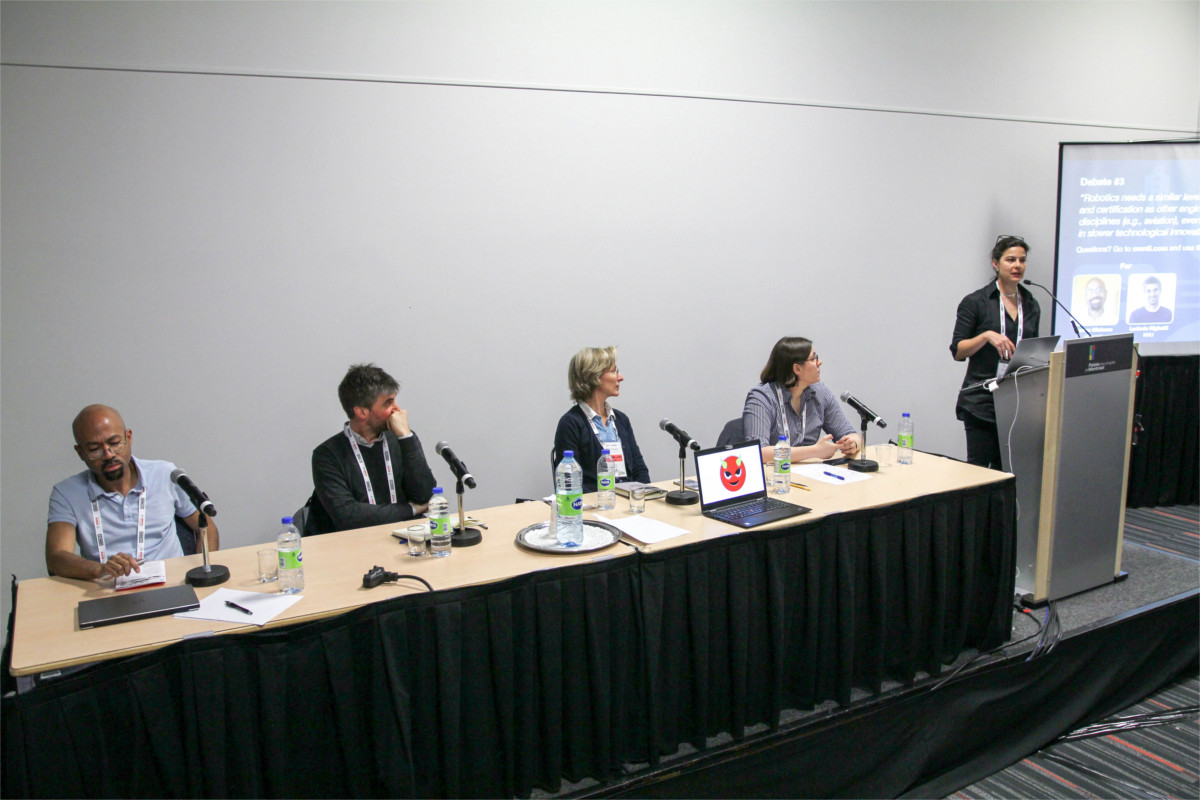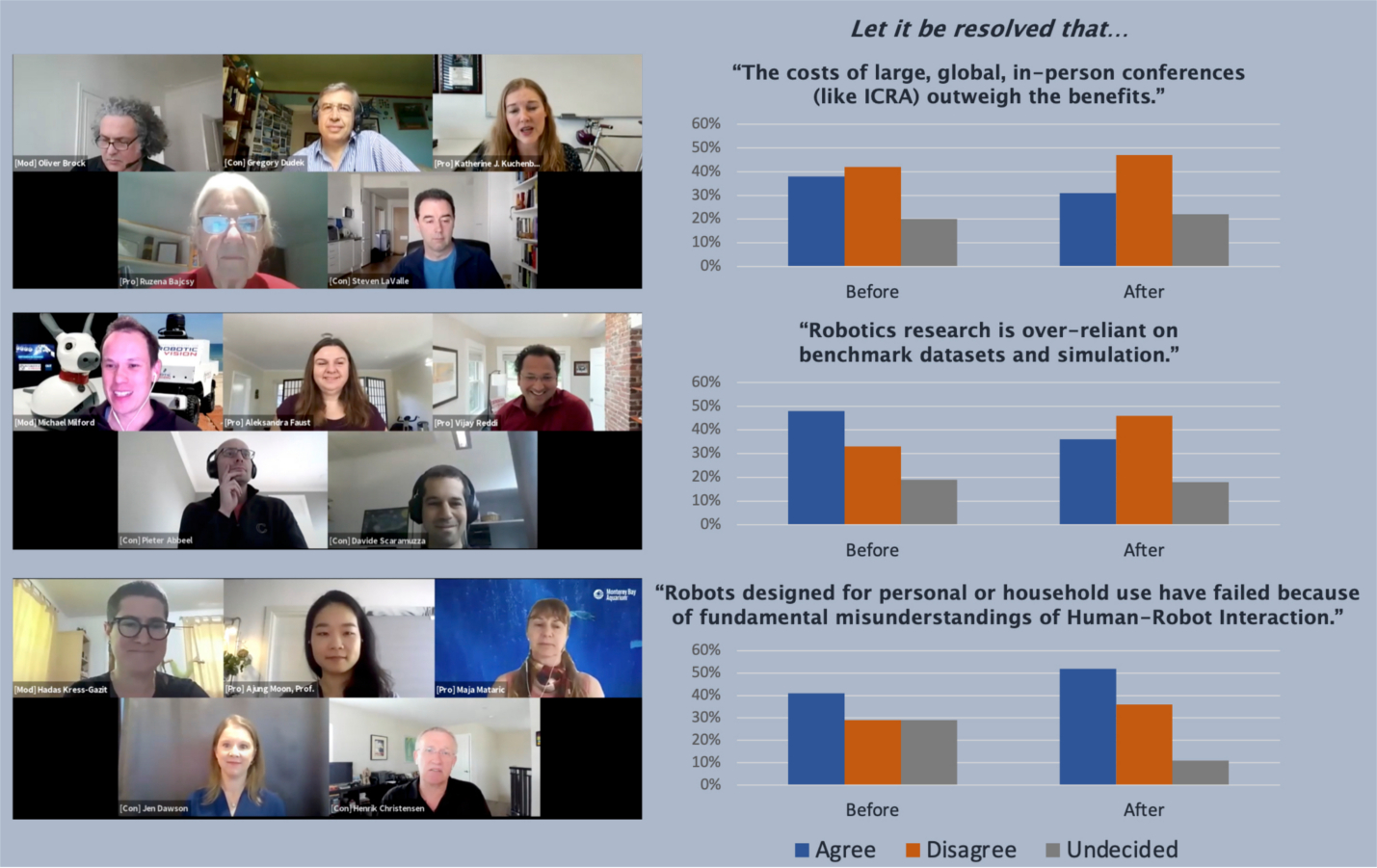
Robohub.org
The future of robotics research: Is there room for debate?

Participants James Mickens, Ludovic Righetti, Aude Billard, Melonee Wise and moderator Hallie Siegel at the ICRA 2019 “Debates on the Future of Robotics Research” workshop
By Brian Wang, Sarah Tang, Jaime Fernandez Fisac, Felix von Drigalski, Lee Clement, Matthew Giamou, Sylvia Herbert, Jonathan Kelly, Valentin Pertroukhin, and Florian Shkurti
As the field of robotics matures, our community must grapple with the multifaceted impact of our research; in this article, we describe two previous workshops hosting robotics debates and advocate for formal debates to become an integral, standalone part of major international conferences, whether as a plenary session or as a parallel conference track.
As roboticists build increasingly complex systems for applications spanning manufacturing, personal assistive technologies, transportation and others, we face not only technical challenges, but also the need to critically assess how our work can advance societal good. Our rapidly growing and uniquely multidisciplinary field naturally cultivates diverse perspectives, and informal dialogues about our impact, ethical responsibilities, and technologies. Indeed, such discussions have become a cornerstone of the conference experience, but there has been relatively little formal programming in this direction at major technical conferences like the IEEE International Conference on Robotics and Automation (ICRA) and Robotics: Science and Systems (RSS) Conference.
To fill this void, we organized two workshops entitled “Debates on the Future of Robotics Research” at ICRA 2019 and 2020, inspired by a similar workshop at the 2018 International Conference on Machine Learning (ICML). In these workshops, panellists from industry and academia debated key issues in a structured format, with groups of two arguing either “for” or “against” resolutions relating to these issues. The workshops featured three 80-minute sessions modelled roughly after the Oxford Union debate format, consisting of:
- An initial audience poll asking whether they “agree” or “disagree” with the proposed resolution
- Opening statements from all four panellists, alternating for and against
- Moderated discussion including audience questions
- Closing remarks
- A final audience poll
- Panel discussion and audience Q&A
The “Debates” workshops attracted approximately 400 attendees in 2019 and 1100 in 2020 (ICRA 2020 was held virtually in response to the COVID-19 pandemic). In some instances, panellists took positions out of line with their personally held beliefs and nonetheless swayed audience members to their side, with audience polls displaying notable shifts in majority opinion. These results demonstrate the ability of debate to engage our community, elucidate complex issues, and challenge ourselves to adopt new ways of thinking. Indeed, the popularity of the format is on the rise within the robotics community, as other recent workshops have also adopted a debates format — for instance, the 2${}^{nd}$ Workshop on Closing the Reality Gap in Sim2Real Transfer for Robotics or Soft Robotics Debates).

Audience agree/disagree poll results before and after each debate of the virtual “Debates” workshop at the 2020 IEEE International Conference on Robotics and Automation (ICRA)
Given this positive community response, we argue that major robotics conferences should begin to organize structured debates as a core element of their programming. We believe a debate-style plenary session or parallel track would provide a number of benefits to conference attendees and the wider robotics community:
- Exposure to ideas: Attendees would have more opportunities to be exposed to unfamiliar ideas and perspectives in a well-attended plenary session, while minimizing overlap with technical sessions.
- Equity: Panellists and moderators no longer have to choose between accepting a debate invitation, accepting a workshop speaking engagement, supporting their students’ workshop presentations, and/or hosting a workshop of their own. Some of these conflicting responsibilities disproportionately affect early career researchers.
- Inclusion: Conference organizers have the discretion to provide travel support, enabling panellists and moderators from a wider range of countries, career stages, and backgrounds to participate.
- Impact: A notable Science Robotics article cited debates as a necessary driver of progress towards solving robotics’ grand challenges. By facilitating structured and critical self-reflection, a widely accessible debates plenary could help identify avenues for future work and move the field forward.
The driving force behind such an event should be a diverse debates committee responsible for inviting representatives within and outside academia, with different research interests, at different career stages, and from different parts of the world. The committee will also lead the selection of appropriate debate topics. Historically, our debate propositions revolved around three key questions: “what problems should we solve?”, “how should we solve them?”, and “how do we measure success and progress?”.
Recent high-profile shutterings of several prominent robotics companies testify to the importance of identifying the right problem. How do we transform our research into products that provide value to end-users, while keeping in mind our environmental and economic impact? How can we quickly introspect, learn from, and pivot in response to failures, as well as avoid repeating past mistakes? Our 2020 resolution, “robots designed for personal or household use have failed because of fundamental misunderstandings of Human-Robot Interaction (HRI),” provided an opportunity to discuss such questions.
As a multidisciplinary field drawing on advances in machine learning, computer science, mechanical design, control, optimization, biology, and more, robotics has a wealth of tools at its disposal. A central problem in robotics research is then to identify the right tool for the right problem. Our 2019 debate proposition, “The pervasiveness of deep learning in robotics research is an impediment to gaining scientific insights into robotics problems.”, probed the ascendance of data-driven approaches to robotics problems, and attracted a large audience.
In addition to identifying the right problems and the right tools to solve them, it is equally important to discuss how best to evaluate and compare proposed solutions. A central tension in robotics research is how to strike a balance between accessible and replicable benchmark datasets, and real world experiments. Our 2020 debate proposition, “Robotics research is over reliant on benchmark datasets and simulation”, challenged the audience to consider how to rigorously and accessibly evaluate the performance of robotic systems without overfitting to a particular benchmark. Indeed, failures to adequately evaluate robotics algorithms have already led to tragic loss of life, underscoring the importance of establishing common standards for measuring the performance and safety of our technologies in the context of rapid commercialization and real-world deployments. These standards must be informed by regular and rigorous critical reflection on our ethical obligations as researchers, practitioners and policymakers. The fact that our 2019 debate proposition, “Robotics needs a similar level of regulation and certification as other engineering disciplines (e.g., aviation), even if this results in slower technological innovation”, attracted and resonated with a significant audience is evidence of demand for structured discussion of these topics.
As robotics technologies continue to move from the research laboratory to the real world, we believe there should be room for debate at major robotics conferences. Enshrining debate as a core element of major robotics conferences will serve to create opportunities for self-reflection, establish institutional memory, and drive the field forward.
For more information, please see https://roboticsdebates.org/.
tags: c-Politics-Law-Society, ethics





